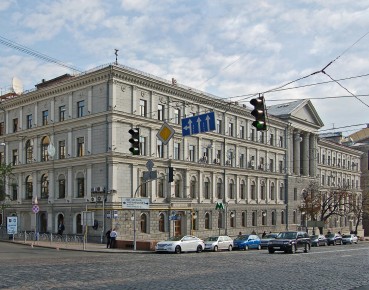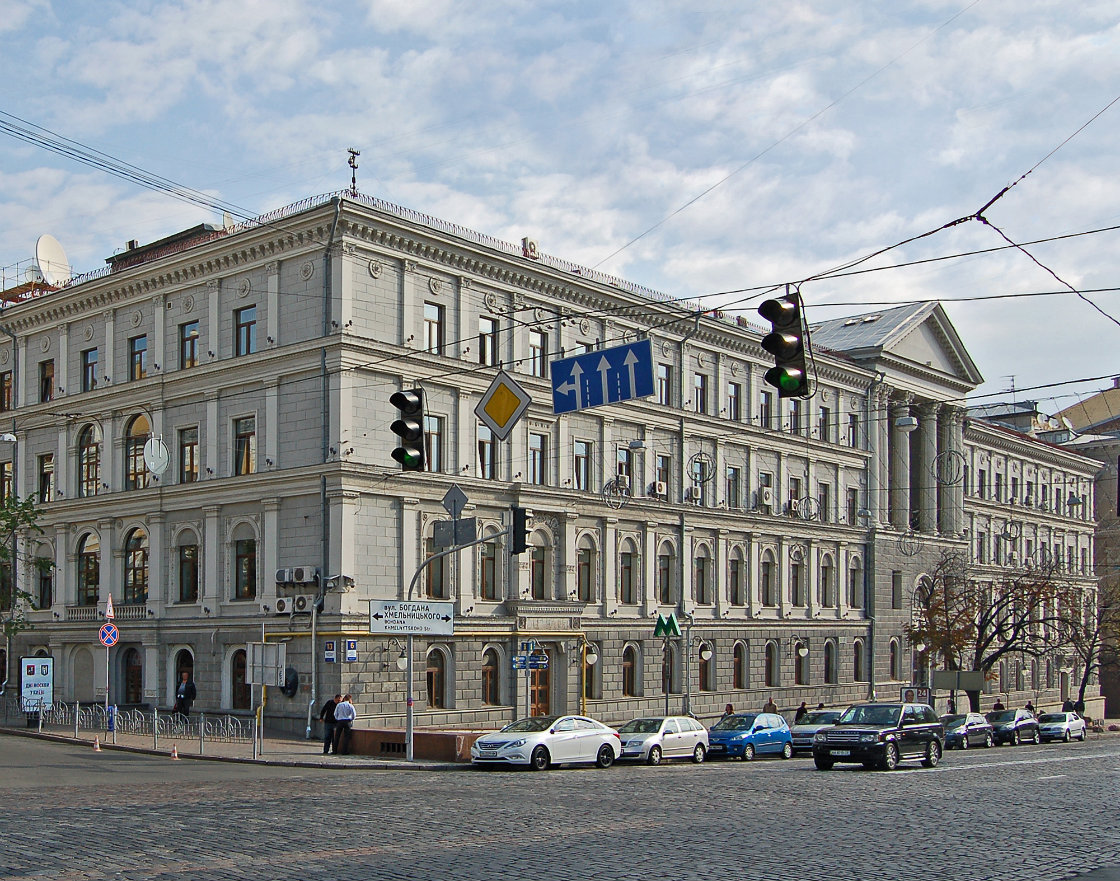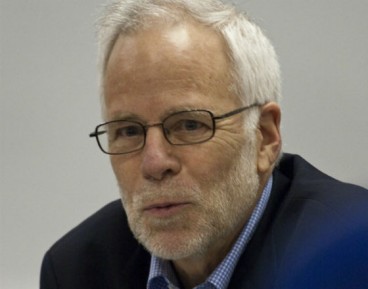Tydzień w gospodarce
Category: Trendy gospodarcze

Naftogaz headquarters, Kiev, Ukraine (AMY, CC BY-SA 3.0)
In November 2019, “The New York Times” published an interview with the influential Ukrainian oligarch Ihor Kolomoysky. In the article, he argued that Ukraine could abandon its cooperation with the West and turn back to Russia: “They’re stronger anyway. We have to improve our relations. We’ll take USD100bn from the Russians. I think they’d love to give it to us today. What is the fastest way to resolve issues and to restore the relationship? Only money,” said Kolomoysky. These are just words, but if we were to look at specific developments, it turns out that Ukraine has been increasingly drifting to the East for some time now.
According to the data of the State Statistics Service of Ukraine, after ten months of the past year, Russia ranked the third on the list of countries whose companies are responsible for the most foreign direct investments (FDI) in the Ukrainian economy. However, if we consider the fact that the only countries ahead of Russia in the ranking are Cyprus and the Netherlands — the favorite jurisdictions of Ukrainian and Russian oligarchs — it turns out that at present Russia is in fact the biggest foreign investor in Ukraine.
The recent negotiations on the transit of Russian gas through Ukraine to Western European countries overshadowed the signing of a no less significant agreement. In early December 2019, the state-owned company Ukrtransnafta signed a ten-year agreement on the transportation of Russian oil with the Russian company Transneft. This ensures that the Russians will maintain a strong position on the Ukrainian fuel market.
At the same time, companies linked to Viktor Medvedchuk, the head of the pro-Russian party Opposition Platform — For Life (the Russian President Vladimir Putin is the godfather of his daughter), resumed the supplies of Russian fuel — which were halted in the summer — using a pipeline taken over by the state.
In total, 30 thousand tons of oil were transported in December. According to data presented by analysts specializing in the Ukrainian fuel market, the share of Russian oil is growing rapidly. In October 2019 it already reached 32 per cent.
At the end of 2019 the Ukrainian parliament adopted a new law concerning the regulation of prices on the electricity market. In response to the criticism of electricity imports from Russia, the new legislation includes provisions prohibiting such imports. However, a special loophole was left for such purchases — the government has the right to lift the ban on imports from Russia for a period of time it deems necessary in order to “avoid an emergency situation in Ukraine’s energy system”.
The import of electricity purchased on the Day-Ahead Market is also allowed. According to critics, the Russians and the Belarusians are supplying electricity to Ukraine at dumping prices. “The Russians are selling energy to their domestic individual customers at a price 40 per cent higher than the one we are paying, while the Belarusians are selling energy at a price that is almost 80 per cent higher. Right now they have knocked down the prices on our market almost to the minimum level,” commented Alexey Kucherenko, the Deputy Chairman of the Ukrainian Parliament’s Energy Committee. He argued that cheap energy supplies from Russia and Belarus would lead to the destruction of Ukraine’s domestic energy sector and the closely connected coal industry.
The situation in the nuclear energy sector is also interesting. Ukraine currently imports 50 per cent of fuel assemblies (that is, the basic fuel for nuclear reactors) from Russia. At the same time, the country is in the process of building its own storage facility for used fuel assemblies, which have so far been sent to Russia for disposal.
However, according to Ukrainian nuclear power industry experts, the process of becoming independent from Russia is at risk. In late November 2019, the union of nuclear power industry workers sent a letter to the President of Ukraine. The experts draw attention to issues such as the shutdown of pro-European nuclear energy development projects by the Ministry of Energy, the “orientation on the Kremlin’s interests”, the withdrawal from the investments of the European Bank for Reconstruction and Development (EBRD) aimed at increasing the safety of the Ukrainian nuclear power plants, as well as the plans to abandon the construction of a central storage facility for used nuclear fuel, which was supposed to be financed by the United States.
The union members argued that “the Russian lobby in the Ministry will soon ruin the efforts to diversify the supplies of nuclear fuel in order to renew the monopoly of the Russian supplier TVEL”.
Officially, Ukraine hasn’t been purchasing natural gas from Russia since 2015, replacing it with so-called “reverse supplies” from Western Europe. “We have not been importing Russian gas for our own needs in the past four years. Five years ago, we launched the reverse flows for the first time, and we guaranteed the supplies of the “blue fuel” from Europe. The market mechanisms have done what the politicians have not been able to do for decades, liberating Ukraine from its political dependence on Russia and from its dependence on Russian gas,” argue the representatives of Naftogaz of Ukraine.
However, more and more people are saying that Ukraine should start purchasing gas from Russia. They argue that the recent imports from Western Europe were mainly a “virtual reverse”, and that in reality the gas was still supplied to Ukraine directly from Russia. Meanwhile, various intermediary entities emerged between Gazprom and Naftogaz, and started earning high commissions for “shuffling papers from one end of the desk to the other”.
“Ukraine has never actually stopped the direct gas supplies from Russia. We are now receiving Russian gas that flows through our territory to Europe and is then listed in our documents as the purchase of gas from European companies. There are no physical reverse flows. That is impossible without cutting off the flow of gas at the border with Russia. For five years nothing has been done in order to diversify gas supplies to Ukraine. The conclusion of a direct contract with Gazprom will not change anything. However, Naftogaz can buy gas at a lower price than now, without overpaying the intermediaries,” argues an Ukrainian economist, Oleksandr Khmelevskyi.
The Russian Energy Minister Alexander Novak is already encouraging Ukrainian companies to conclude individual contracts for the purchase of gas. “Ukrainian legislation enables not only Naftogaz, but also other Ukrainian companies to buy Russian gas. It’s possible to buy from us, it’s a market. Let them come to us and we’ll sell the gas at a market price. For Ukraine, this would mean lower prices than what they are paying now, purchasing our gas from intermediaries through the reverse supply scheme,” said the Russian minister.
In November 2019, Ukraine’s representatives in the Ukrainian-Russian Commission on Fisheries in the Sea of Azov ignored the warnings issued by experts and signed a protocol approving the conditions for the use of natural resources in the Sea of Azov and the Kerch Strait.
The Ukrainian Ministry of Energy and Environmental Protection argued that failure to sign the protocol “would be conducive to an increase in illegal catching of aquatic bio-resources in the Sea of Azov and would hurt the performance of the domestic fishing industry”. Moreover, if the protocol wasn’t signed, Ukraine would lose the right to conduct fishing activities in the Sea of Azov and Russia would be able to accuse Ukraine of violating international law.
Previously, the Foreign Affairs Committee of the Ukrainian Parliament asked the government to withdraw its consent to the functioning of the Ukrainian-Russian Commission on Fisheries in the Sea of Azov, stating that “none of the arguments for the necessity of talks with the Russians seem convincing”.
Andrii Klymenko, an expert at the Maidan of Foreign Affairs think-tank, analyzed the findings of the commission and pointed out that the document signed by the Ukrainian side gives Russia the right to independently decide on the fishing activity in the Kerch Strait.
In his opinion, it was agreed that fishing vessels from the Russian-annexed Crimea will be able to conduct fishing activities in the Sea of Azov on the basis of permits issued by the Russian authorities, which is equivalent to a recognition of Russia’s annexation of the peninsula. The agreement also allows the spy-ships of the Russian special services to cruise along the Ukrainian coast. Klymenko notes that the Ukrainian legislation allows Ukraine to independently determine the fishing quotas in the Sea of Azov.
Meanwhile, the protocol provides undue privileges to fishing vessels operating under the Russian flag, while over the past five years Ukrainian fishermen only used an average of 17-20 per cent of their annual quotas. Moreover, there are no provisions in the international law which would oblige Ukraine to consult with Russia on fishing quotas — in accordance with the maritime law Ukraine may do that, but does not have to.
In addition, Ukrainian fishermen primarily use small vessels that only operate in the coastal zone, which is not affected by any arrangements with Russia, as it is subject to the exclusive jurisdiction of Ukraine. “The only action that the Ukrainian side should take is to protect its coastal zone in order to ensure that Russia is not posing a threat to Ukrainian fishermen,” says the expert.
The Ukrainian parliament is working on gambling legalization legislation. Gambling has been prohibited in Ukraine since 2009, after a crowded gambling hall with slot machines was burned down in Dnipropetrovsk as a result of organized criminal groups’ brutal competition for control of this lucrative business. The fire killed 9 people.
According to Boris Kushniruk from the Ukrainian Analytical Centre, the proposed legislation favors Russian companies. “It provides for a number of legal and economic barriers to the entry of European and leading international companies to Ukraine’s sports betting market. As a result, a well-known Western brand wanting to invest in the development of its business in Ukraine will not be able to obtain a license and to enter the market with a profitable business model,” says Kushniruk.
The Ukrainian media revealed that the government’s draft act legalizing gambling was in fact prepared at a law firm providing legal services to the betting company Pari-Match, which has a strong Russian presence.
At the meeting of the parliamentary committee that dealt with the draft legislation, the proposed act was presented by Boris Baum, a Russian citizen associated with companies belonging to Alexander Babakov, who is a member of the Federation Council of Russia sanctioned by the United States and the European Union. Mr. Baum is also associated with Mikhail Spektor, the owner of the Premier Palace Hotel in Kiev. “The adoption of this law will allow him to open a casino in his hotel, especially since he has experience in conducting gambling parlors at such a level,” concludes the censor.net news website.



